Charities fight downturn with business know-how
- Published
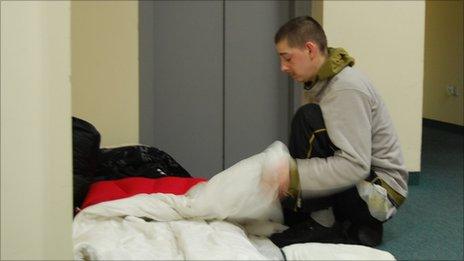
Neil Cain has made the floor of a Salvation Army centre in Luton his home
Neil Cain, a 27-year-old father of three, is packing up his sleeping bag and an air mattress, getting ready to brave the winter freeze.
"I haven't got an address," Mr Cain says.
Mr Cain has spent the night at the Salvation Army centre in Luton, which provides shelter for the homeless as December's degrees begin to drop.
"The most important thing that I get here is warmth," he says.
"This is like my home."
The Winter Shelter has long been run by the charity Noah's Enterprise, though these days it is struggling to go on.
Like many larger charities that provide broader public services, a good half of Noah's resources have - until now - relied on government money.
But with government austerity measures underway, it is clear that money is about to get much harder to come by.
Enterprising move
In order to compensate for the effects of wider austerity measures, Noah director Jim O'Connor is seeking to expand the entrepreneurial side of the charity.
Noah, which has three retail outlets in the heart of Luton, has become a bit of a social entrepreneur.
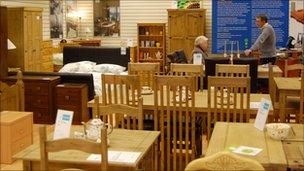
Professionally run charity shops help bridge the funding gap as government spending cuts bite
One of its outlets sells second-hand furniture, another is a bric-a-brac store. A third, called ArkAid, sells furniture that is new.
From the outside, the ArkAid shop looks like any other department store.
"We like to retain a wholly professional look," explains Mr O'Connor.
"This image then carries on to the users of our services."
ArkAid represents the latest in charitable fundraising and it is an essential development in the organisations' battles for survival, according to Mr O'Connor.
Charities without social enterprise "will go to the wall", he says.
New directions
It is a lesson recently learnt by the Luton Accommodation & Move-on Project (Lamp).
In July last year, Lamp lost £34,000 of its funding from Connexions, a government support service for young people aged between 13 and 19 years.
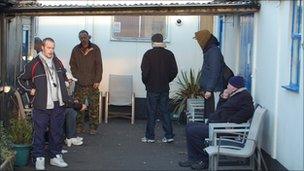
Many of Luton's homeless get food and help at Noah's day centre
And the chief of the charity for young homeless people, John Archer, expects further cuts in the future to be matched by growing demand for its services.
So in the future, Lamp will be eyeing commercial opportunities, rather than relying on the government for 80% of its funding.
"I have to completely change the way I do business with local authorities," says Lamp's director, John Archer.
"In the past, there was just bidding. Now I have to find a model of contracts."
One alternative, he says, would be to go into retail.
This he says, would both bring in an income for the charity and give an opportunity for homeless people to become trained in skilled trades.
Service point
At the day centre for the homeless, the rehousing co-ordinator advises a young woman. Names spill over on a sign-up sheet pinned to the corridor walls.
Working on a £1.5m annual budget, Noah provides training and access to legal, housing and medical aid - all under one roof.
"We bring together those otherwise out of reach with social services," explains Mr O'Connor.
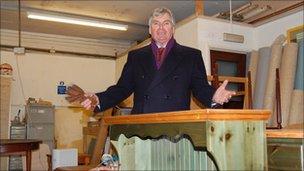
Noah director Jim O'Connor has seen funding from the council disappear
"We are like the hub in the middle of the bicycle wheel."
Once a week, a van hosts a doctor's clinic. Twice a week, the same van is transformed into a dental practice.
In 2007, Noah won a bid that secured £400,000 of government funds.
This allowed it to buy in statutory services, including the employment of three full-time professional staff and a psychiatric nurse.
The idea was to add to public services that would then be commissioned by the local authorities.
Mr O'Connor says Luton Borough Council told him it had no other option but to decommission the services, as it saw its own budget cut in the Spending Review in October.
The cuts from the Review followed the Council's loss of nearly £6m in grant funding in June.
"It is a very disappointing grant settlement for Luton," says Trevor Holden, chief executive of Luton Borough Council.
"The massive savings required over the next few years will mean every department will have to make adjustments, particularly as we are faced with increasing demands and costs."
Costly savings?
Mr O'Connor is clearly disappointed by the council's decision to decommission the services. The way he sees it, they are making a costly mistake.
Losing Noah could see services worth £1m lost, not least because of the many hours of voluntary work that remain unaccounted for in Noah's balance sheet.
In addition, it could send other costs soaring.

Cutting funding to homeless charities could backfire says Noah's Tim Archbold
Without charities such as Noah providing voluntary services, the services would need to be absorbed by government departments, he reasons.
This could be much less efficient and more costly.
"It is much more efficient to have one contact person with local expertise and who knows the needs of the people," says Tim Archbold, Noah's welfare services manager.
"Imagine if you had all the different government departments trying to speak to each other about one client - it just wouldn't work."
Add to that the cost of extra hospital services once the homeless are rescued from Luton's frozen streets, or the drain on police resources as some of them turn to crime to survive, and the conclusions should be obvious, he maintains.
Squats and sofas
Over the past 12 months, Noah has seen an increase in referrals from social services and the police.
Hit by the economic downturn, many have lost their jobs and been unable to pay their mortgages.
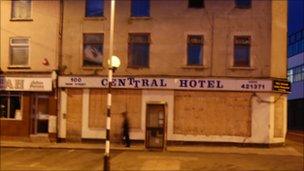
These days, homeless people often stay in squats or on friends' sofas
Others come with domestic problems and without the documentation required to find work.
But, by and large, today's homeless do not sleep under bridges or in cardboard boxes.
"Today, homelessness is about sleeping between squats and on the odd friends' sofa," says Mr Archbold.
"The aim is to stop this spiralling into a long-term cycle."
So to survive, charities will have to be shrewd about how they go about their business.
As the effects of the government's austerity measures begin to be felt, many will find that merely rattling charity boxes will bring in too little to bridge future funding gaps.
- Published9 December 2010
- Published13 December 2010